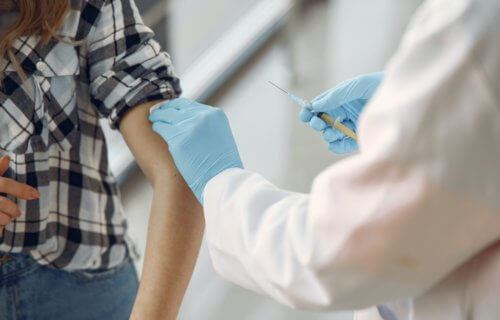LONDON — Side-effects from taking the coronavirus vaccine continue to be a major concern for those taking the shot and those avoiding vaccination. While muscle aches, skin reactions, and even blood clots have become common concerns during the vaccine rollout, a new study says thousands of women are dealing with another troubling issue. Researchers say they’re starting to see vaccinated women experiencing changes in their periods and unexpected vaginal bleeding.
A report in The BMJ reveals that over 30,000 women in the United Kingdom alone have experienced these new side-effects after getting the COVID-19 vaccine.
The patients voluntarily reported their post-vaccination symptoms to the UK’s Medicines and Healthcare Products Regulatory Agency (MHRA). The agency’s yellow card surveillance scheme tracks all drug reactions from each of the COVID vaccines currently in use. Typically, patients report feeling a sore arm, fever, fatigue, and myalgia following vaccination.
While the new side-effects are concerning, the study’s lead author says this disruption in the menstrual cycle doesn’t appear to be affecting a woman’s chances of having a baby.
“Most people who report a change to their period after vaccination find that it returns to normal the following cycle and, importantly, there is no evidence that COVID-19 vaccination adversely affects fertility,” says Victoria Male, a lecturer in reproductive immunology at Imperial College London.
“Although reported changes to the menstrual cycle after vaccination are short lived, robust research into this possible adverse reaction remains critical to the overall success of the vaccination program,” Male adds.
Pregnancy fears driving vaccine hesitancy among women?
The researcher notes that many women are avoiding coronavirus vaccination due to several false claims about what the vaccines are doing to their fertility chances. With that in mind, Male urges scientists to thoroughly investigate changes to the menstrual cycle due to COVID vaccination. If they can find a definitive link, women can better prepare for altered cycles after getting their shots.
In the meantime, the study author encourages women to report any changes in their periods or any unexpected bleeding to their local health officials, especially those tracking side-effects to the COVID vaccine.
“One important lesson is that the effects of medical interventions on menstruation should not be an afterthought in future research. Clinical trials provide the ideal setting in which to differentiate between menstrual changes caused by interventions from those that occur anyway, but participants are unlikely to report changes to periods unless specifically asked. Information about menstrual cycles and other vaginal bleeding should be actively solicited in future clinical trials, including trials of COVID-19 vaccines,” Male concludes.
According to the CDC, over 76 percent of America’s adult population have received at least one dose of the COVID-19 vaccine. Severe side-effects such as anaphylaxis or thrombosis remain extremely rare.

my continued fear is that pharma corp. are making so much money and sharing the profits with agencies that are supposed to be protecting citizens, are they becomming compromised. example it is now obvious that the covid vaccine is not providing protection from spreading covid but does reduce the chance of death. the term vaccine should be reserved for treatments that stop a desiese in its tracks, but the term vaccine was given to this shot in order to release any liability to the company developing these shots. remove the term vaccine, start calling it the covid shot and let the lawyers have at them. if you have so much confidence in the safety of their vaccine they should have no issue in removing the term vaccine . might also stop all the foolish mandates if accountability for their stupidity can be settled in civil cases